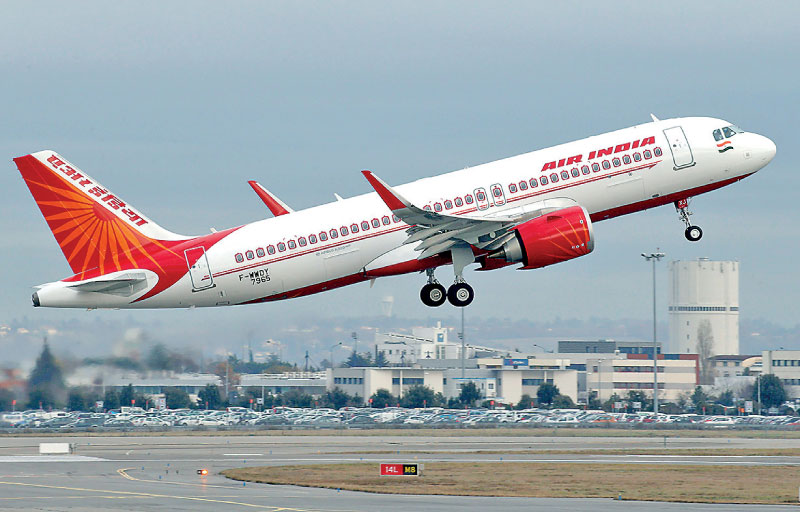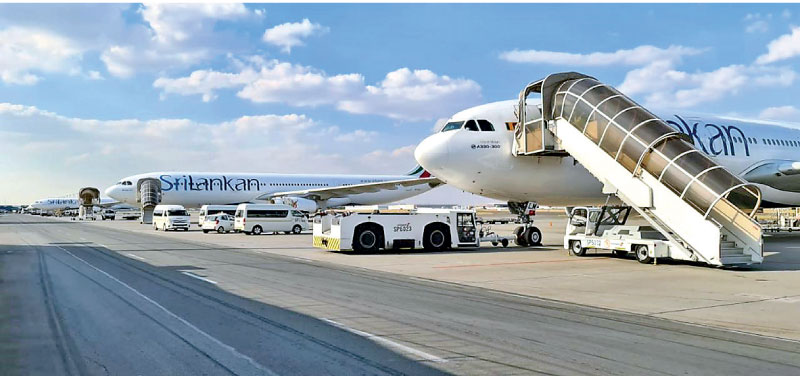Wednesday Feb 18, 2026
Wednesday Feb 18, 2026
Monday, 11 October 2021 00:00 - - {{hitsCtrl.values.hits}}

Privatisation should not take into account the nationality of the purchaser, but that a foreign acquisition would, on balance, yield a more sustainable solution
 Air India, which was losing $ 3 million a day on average (over $ 1 billion per year) has been sold for what amounts to loose change for a conglomerate the size of Tata Sons: $ 400 million plus the assumption of $ 2 billion out of the massive debts in excess of $ 8 billion accumulated by the state-owned carrier over the years.
Air India, which was losing $ 3 million a day on average (over $ 1 billion per year) has been sold for what amounts to loose change for a conglomerate the size of Tata Sons: $ 400 million plus the assumption of $ 2 billion out of the massive debts in excess of $ 8 billion accumulated by the state-owned carrier over the years.
But this is a good deal for the people of India. It is one that we in Sri Lanka should study and emulate.
Air India, founded by the Tatas in 1932, was expropriated by the state a few years after independence. It, and Indian Airlines which was merged with it a few years back, had the backing of the state, unlimited financing, and monopoly rights in both the domestic and international segments. Yet, service was awful, and profits were rare.
As the market was opened to competition, first in the domestic segment and then in the international, the two state-owned airlines failed to meet the challenge. Even today, Air India is smaller than IndiGo, an airline which commenced operations in 2005.
The greatest benefit to the public is the avoidance of subsidising the airline. The government will still have to deal with the remaining debts of the company but at least the liabilities will not keep growing. And if the Tatas manage to turn it around, the government will receive tax revenues.
100% sale
It took the Modi government four years to get to this point in the sale. But in fact, various Indian governments have been trying to do something about this bleeding sore for much longer. Earlier attempts failed because the government was trying to keep an ownership stake and the ability to interfere in management.
In 1998, the Kumaratunge government sold only 40% of the money-losing and inefficient Air Lanka for $ 70 million. It bundled the sale with a 10-year management contract to Emirates. But given the crudity of how the letter and spirit of the management contract was violated by the government in a fit of pique, it was unlikely that any new investor/manager would trust the government of Sri Lanka to keep its word.
Back in the 1990s or even in the following decade, state-owned airlines were seen as having value. But over time, the environment has changed, and they are beginning to look less like marquee investments and more like collections of landing slots and aircraft. With the present transaction, more attention is being paid to Air India’s Heathrow landing slots than the value of its brand or the prestige of being a flag carrier. The airline business is a regulated activity vulnerable to state interference and coercion. Even having 100% ownership is not going to protect an airline with the major presence in a national market from the caprice of a head of state annoyed that his entourage did not all get seats in business class. But it is better than having thieves foisted on the airline as managers. The thievery engaged in by SriLankan management is now in the public record, thanks to the Airbus investigation.
For how much?
Even when Emirates was remitting dividends to Treasury, the airline itself was not profitable (though it was not haemorrhaging money like after Emirates departed); the real money makers were catering and ground handling, which were monopolies. The considerable pressures that will be exerted to bundle these activities along with the airline to show a less cringeworthy sale price should be resisted.
Once we get rid of the money-guzzling airline, action should be taken to provide the best possible services to all airlines without discrimination through optimal use of the tools of competition: competition for the market and competition in the market.
The Government can save face by manipulating the debt component of the sale, as has been demonstrated in India. Because the government of India is absorbing more of the debt than the stated sale price of $ 2.4 billion or the actual cash component of $ 400 million, an uncharitable observer could even claim that the Modi government is giving away an airline for nothing. But that disregards how much is saved by not having the white elephant in government hands: more than $ 1 billion a year.
With SriLankan, the avoided losses to Treasury would be Rs. 99 million a day, the average per day loss incurred by the airline in 2018, 2019 and 2020. The less abnormal years of 2018 and 2019 were included lest it be said that no general claims could be made from losses in a pandemic year. Rs. 99 million ($ 0.5 million a day) is quite a bit lower than Air India’s $ 3 million a day benchmark. But it must be remembered that most things in India are around 50 times the size of Sri Lanka, whereas the daily loss is only six times.
But still, not losing Rs. 36 billion per year ($ 180 million) a year would be nice. That’s close to one fourth of what the Government spent on pensions in 2020. In times like this, every billion matters.
But it should be Sri Lankan
Once I was on a TV talk show with JVP leader, making headway with the argument that the taxes paid on potatoes and milk powder by a housewife in Siyambalanduwa should not be spent on subsidising SriLankan Airlines. He conceded that such subsidies were wrong and that the government appeared incapable of running an airline. But he said, why do we have to sell it to foreigners? Why cannot some good Sri Lankan capitalists take it over and run it professionally?
So shocked was I by this ceding of ground that I was unable to properly respond, which I will do now. My first response would have been to say that from a Marxian perspective the nationality of the capitalist makes no difference. Exploitation is no less objectionable because the capitalist carries the same passport as the exploited. But then, perhaps Marxism is no longer relevant, this being three decades after the fall of the Berlin Wall and all that.
As a consumer why would I care about anything other than the price-quality bundle offered by the airlines offering service to the destinations I wished to travel to? If one of the airlines happened to be a lossmaker like Air India or SriLankan, subsidised by other people’s tax dollars, that would be even better for me as a consumer.
But then, it could be argued that this was a form of predatory pricing, whereby even efficient airlines were driven to rack and ruin because they have to match the artificially low prices of the state-subsidised carriers. As a consumer I would not care, but perhaps as a policy maker I may. The remedy for this would be some form of inter-state agreement not to offer subsidies, as there exists in the European Union.
But this would be a digression, because the whole point of privatising to a foreign or domestic investor would be to get away from subsidising the flying rich. If the investor believed he would not be bailed out, he would run the business in a responsible manner, offering reasonable prices and withdrawing from ruinous competition where such popped up. The only danger would be the state (or the Cardinal through the state) exerting pressure not to withdraw from unprofitable routes, something SriLankan is very familiar with.
Who would be able to better resist such pressures, a domestic or a foreign investor? The answer being the latter, I would conclude that privatisation should not take into account the nationality of the purchaser, but that a foreign acquisition would, on balance, yield a more sustainable solution.
